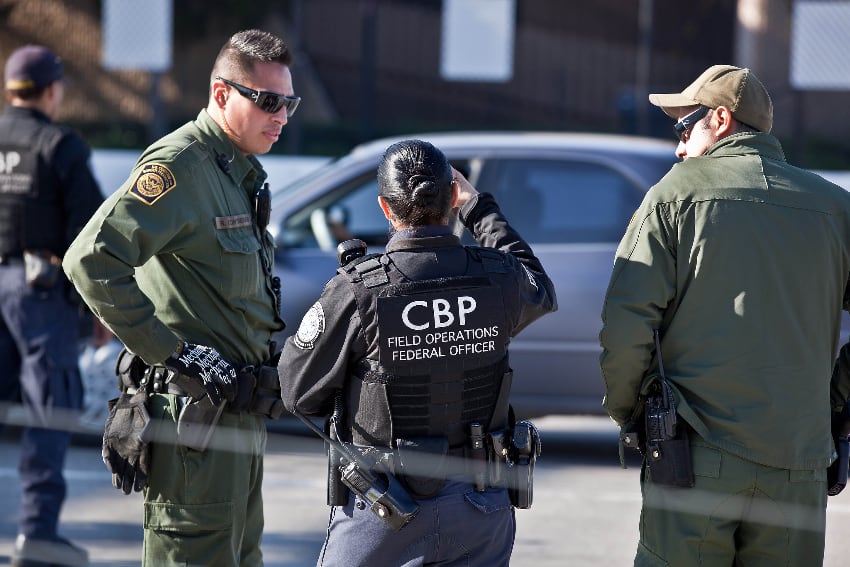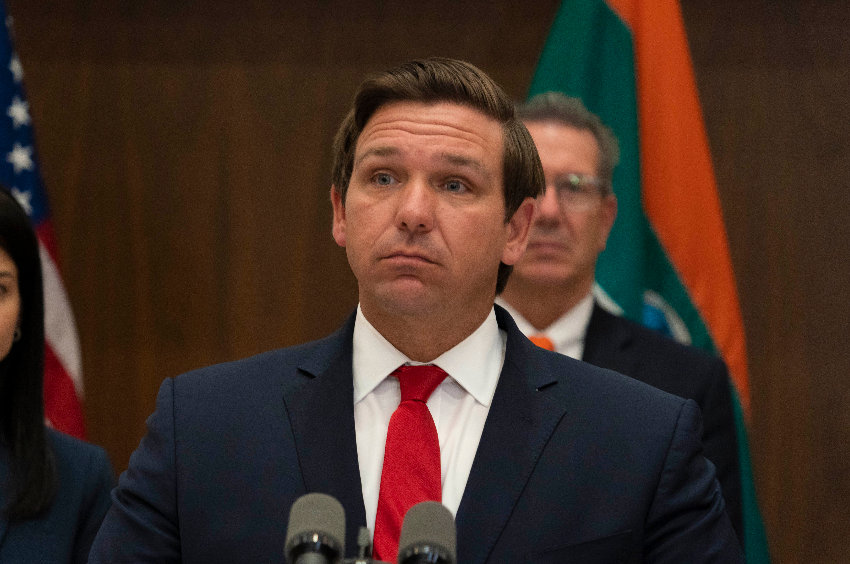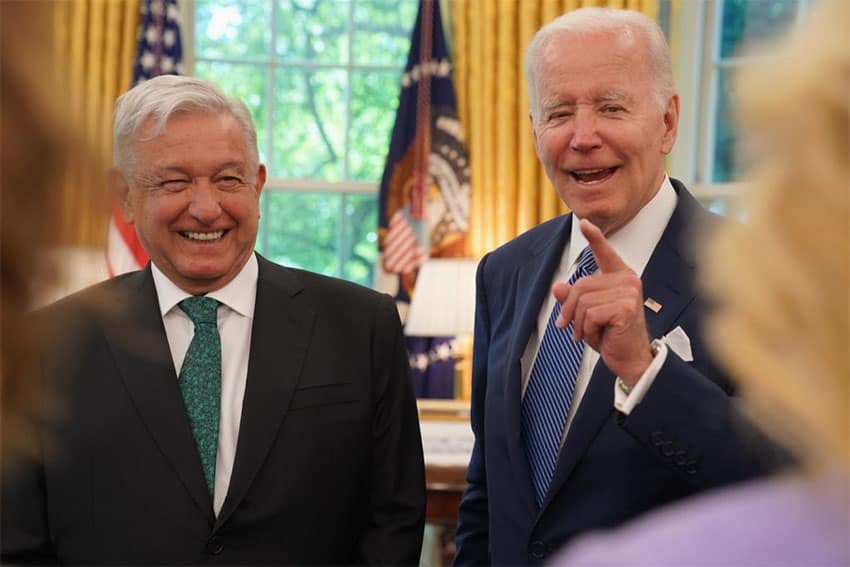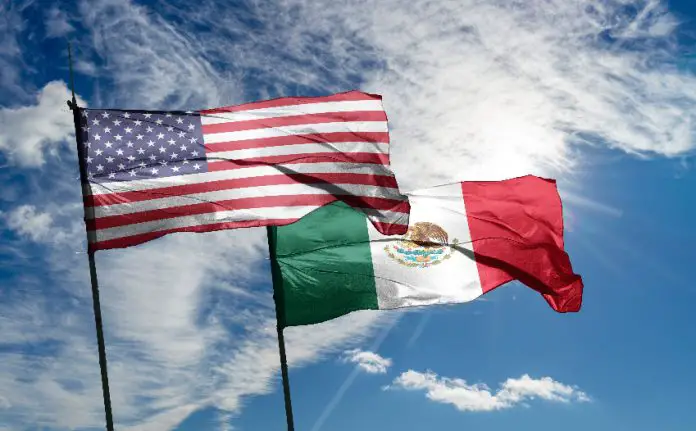A strong majority of people in the United States believe that the U.S. and Mexico have equal responsibility for stopping illegal immigration and drug trafficking, yet only 16% see Mexico as a close ally, according to the results of a recent poll.
Still, 52% of respondents believe that the United States has a friendly relationship with Mexico, and close to seven in 10 have a favorable view of Mexican immigrants living legally in the U.S.

The findings come from a survey conducted by The Pearson Institute for the Study and Resolution of Global Conflicts at the University of Chicago and The Associated Press-NORC Center for Public Affairs Research. A total of 1,191 adults from all 50 U.S. states and the District of Columbia completed the survey online or by telephone in late September.
Let’s delve into the results.
Most Americans believe governing the border is a shared responsibility
Almost three-quarters of respondents – 73% – believe that the U.S. and Mexican governments have equal responsibility for preventing the flow of illegal narcotics into the United States.

One in 10 said that the Mexican government should have more responsibility, while 11% believe the greater onus should be on the U.S. government.
Almost two-thirds of those polled – 64% – said that preventing Mexicans from entering the United States illegally is a shared responsibility, while 63% said the same with regard to immigrants from other countries seeking to enter the U.S. from Mexico.
About one in ten respondents said that the Mexican government should have more responsibility for stopping illegal immigration to the United States, while 18% indicated that the U.S. government should take the leading role.
A strong majority – 62% – said that the Mexican government should have the greatest responsibility for combating organized crime in Mexico, but 30% believe that both governments should have an equal responsibility.

“We should be working hand in hand with Mexico to take the cartels down,” said Kris Bennefield, a 41-year-old respondent from San Augustine, Texas.
Just 3% of respondents said that the U.S. government should take the lead in the fight against Mexican cartels on Mexican soil.
Some Republican Party politicians have advocated the use of the United States military against Mexican cartels in Mexico. Florida Governor Ron DeSantis, for example, has pledged to make immediate use of the United States military to combat Mexican cartels in Mexico if he becomes U.S. president.
The U.S. and Mexican governments say they are cooperating closely on shared security challenges, including the fentanyl problem, arms trafficking and migration.
Mexico a friend, but not a close ally?
Asked to describe the relationship between the United States and Mexico, only 16% of respondents said the two countries are close allies. That figure rose to 25% among people who identified as Hispanic.
Just over half – 52% – said that the U.S. and Mexico have a friendly relationship but are not close allies, while 25% said that the two countries are not friendly but not enemies. One in 20 respondents described the U.S. and Mexico as enemies.
The pollsters noted that “Democrats are more likely to describe Mexico as a close ally compared to Republicans (21% vs. 13%).”
Respondents were also asked to describe the United States’ relationship with Canada, and 62% said that the two countries are close allies – almost four times the number who said the same about the U.S. and Mexico.

The view of most ordinary United States citizens differs from that of U.S. officials, who have emphasized the closeness of the relationship with Mexico.
During a press conference at the conclusion of the 2023 Mexico-U.S. High Level Security Dialogue in Mexico City earlier this month, Secretary of State Antony Blinken said that “more than ever before” in his 30 years of experience in foreign policy, “the United States and Mexico are working together as partners in common purpose.”
What Mexico-related foreign policy goals should the U.S. prioritize?
Survey respondents were asked to offer an opinion on how important it is for the United States to:
- Prevent illegal immigration across the United States-Mexico border.
- Create more opportunities for legal immigration from Mexico to the United States.
- Increase trade with Mexico.
- Reduce inequality and poverty in Mexico.
Just over eight in 10 respondents believe that preventing illegal immigration is extremely, very or somewhat important, while 74% said the same about the creation of legal immigration opportunities.
The survey found that 93% of Republicans see stopping illegal immigration as an important goal, whereas the figure for Democrats was 72%. Almost six in 10 Democrats – 57% – said that creating more opportunities for legal immigration was extremely or very important, while just 25% of Republicans said the same.

Just over three-quarters of respondents said that increasing trade with Mexico – which is currently the United States’ largest trade partner – was important, but only 31% considered it an extremely or very important goal.
Reducing inequality and poverty in Mexico – which data shows is already happening – was seen as the least important goal for the United States. Just over six in 10 respondents said that it was an extremely, very or somewhat important goal, while one-third of those polled said that reducing inequality and poverty in Mexico was “not at all “or “not too important.”
What do Americans think of Mexicans in the U.S.?
About seven in 10 respondents – 69% – said they had a very or somewhat favorable view of Mexican immigrants living legally in the United States, with most of the remainder impartial. That figure rose to 75% among Democrats.
In contrast, just 20% of those polled said they had a favorable opinion of Mexicans living in the U.S. illegally. Almost half said they had a very or somewhat unfavorable view of undocumented Mexicans, while just over a quarter said their opinion was neither favorable or unfavorable.
Exactly three-quarters of Republicans expressed an unfavorable opinion on Mexicans living illegally in the United States, while the figure for Democrats was a much lower 30%.

The Associated Press reported that 10 million Mexican (legal and illegal) immigrants are estimated to live in the United States.
Dan Allstun, a Republican and a resident of Los Angeles, expressed concern about people residing in the U.S. and not paying taxes.
However, AP reported that “experts have said that immigrants who are in the country illegally pay sales taxes and that very significant numbers of them also have federal and state tax withholding in their paychecks.”
Allstun, a retired utility company worker, said his belief was that most immigrants to the U.S. are fleeing poor economic conditions in their countries of origin, rather than out of concern for their safety.
“It’s not that these people are bad. They’re coming here for economic reasons. However, it becomes quite difficult for our country to control,” he said.
Opinions on Mexican culture and the Mexican government
About two-thirds of respondents said they had a favorable view of Mexican culture, but only 12% said the same about the Mexican government, which is currently led by the popular – yet divisive – President López Obrador. Almost four in 10 respondents expressed an unfavorable view of the Mexican government, while 39% said they didn’t have a favorable or unfavorable opinion on the federal administration.

López Obrador and President Joe Biden have maintained a cordial relationship, despite the existence of disputes between their respective governments, including on Mexican energy and corn policy. The two leaders are set to met in San Francisco next month for the Asia-Pacific Economic Cooperation Summit.
Engagement with Mexicans and Mexican culture
Over 80% of respondents said they regularly or occasionally interact with people of Mexican heritage in the United States. Six in ten said they engage with Mexican culture in the U.S., although only 13% said they do so on a regular basis.
Those who engage with Mexican culture were more likely to have favorable views on Mexican culture, Mexicans living both legally and illegally in the U.S. and the Mexican government than those who don’t.
The survey found that 53% of respondents have never traveled to Mexico, while 5% regularly visit the country and 41% occasionally make their way south of the border.
Views on the survey results and the U.S.-Mexico relationship
Benjamin Lessing, an associate professor of political science at the University of Chicago and faculty affiliate of the Pearson Institute, told AP that “for two countries that are such close neighbors, so intertwined in each others’ lives, and have been for so long, there’s still room to grow.”
Guadalupe Correa-Cabrera, a professor at Virginia’s George Mason University who specializes in U.S.-Mexico relations, commented on the results about governance of the border.

“There’s a big part of the population that recognizes the importance and the big effort that the two nations are making to work together,” she said.
Correa-Cabrera also spoke about Mexican cultural influence north of the border and the use of immigration and border issues for political purposes.
“Mexico is part of the American culture,” she said, apparently acknowledging the ubiquitousness of things such as Mexican food, beverages, music and art in parts of the United States.
“The politicization of the issues of immigration and border security and how they are used to divide and conquer in elections … [differs] from the realistic perspective of who Americans are in their day-to-day lives,” Correa-Cabrera added.
With reports from AP
